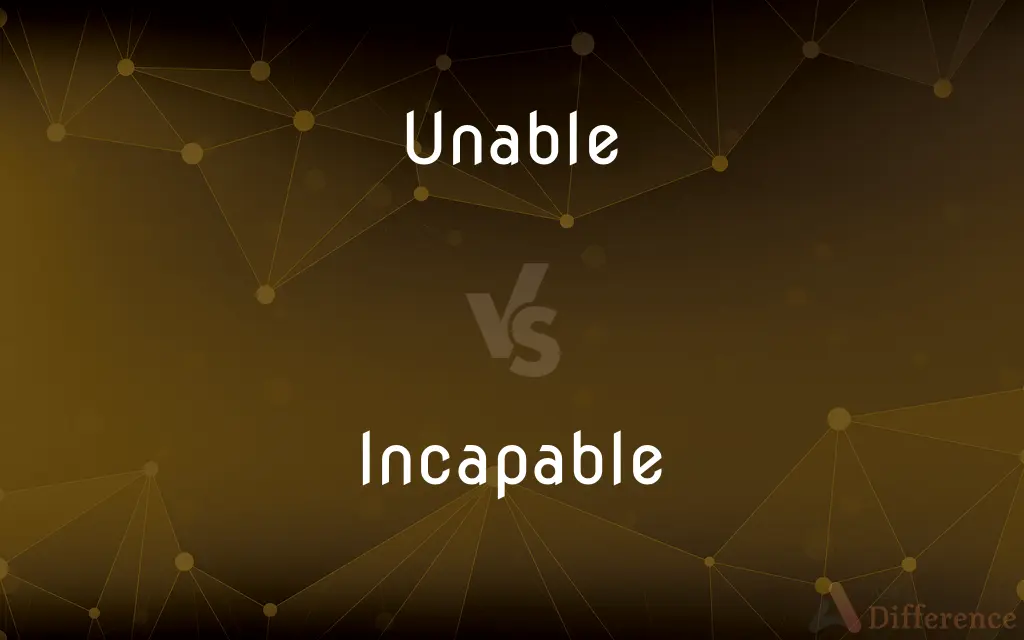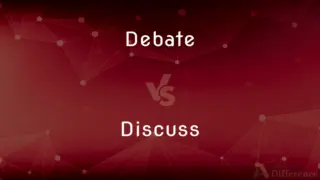Unable vs. Incapable — What's the Difference?
By Tayyaba Rehman & Urooj Arif — Updated on March 25, 2024
Unable refers to a lack of skill, means, or opportunity to do something, while incapable suggests a more inherent lack of ability, strength, or capacity.

Difference Between Unable and Incapable
Table of Contents
ADVERTISEMENT
Key Differences
Unable often relates to temporary or situational constraints that prevent someone from doing something, highlighting a momentary lack of resources, opportunity, or skill. Incapable, on the other hand, suggests a more permanent or inherent deficiency in ability, competence, or strength.
While unable might imply that circumstances could change, allowing for the possibility of the action being taken in the future, incapable suggests that no amount of change in circumstances would alter the individual's fundamental inability to perform the task.
In many contexts, unable is used to describe situations where external factors play a significant role in preventing an action, whereas incapable is used when the limitations are more about personal competencies or qualities.
It's important to note that the distinction between unable and incapable can sometimes blur, particularly in informal usage where the two might be used interchangeably. However, understanding the nuanced differences can add depth to language use and comprehension.
Comparison Chart
Definition
Lacking the skill, means, or opportunity
Lacking the ability, strength, or capacity
ADVERTISEMENT
Nature of Limitation
Often temporary or situational
More inherent or permanent
Implication
Change in circumstances might allow action
Fundamental inability, unlikely to change
Usage Context
External factors play a significant role
Focus on personal competencies or qualities
Examples
Unable to attend due to a meeting
Incapable of understanding complex theories
Compare with Definitions
Unable
Legally or officially not permitted to do something.
Minors are unable to purchase alcohol.
Incapable
Lacking mental capacity or aptitude.
He is incapable of understanding abstract concepts easily.
Unable
Lacking the necessary power, resources, or condition to do something.
He was unable to lift the heavy box due to an injury.
Incapable
Lacking the ability, strength, or capacity to do something.
She is incapable of running a marathon without training.
Unable
Not in a position to do something because of a pre-existing condition.
Unable to concentrate, he left the noisy room.
Incapable
Not able to sustain or support a process or activity.
This soil is incapable of supporting tomato plants.
Unable
Not having the opportunity or possibility to do something.
She was unable to join the conference call because of poor network coverage.
Incapable
Not equipped or qualified to do something.
Incapable of lying, he always tells the truth.
Unable
Temporarily prevented from doing something.
The team was unable to practice due to rain.
Incapable
Fundamentally unable to change or adapt.
The old system was incapable of meeting the new regulatory requirements.
Unable
Lacking the necessary power, authority, or means; not able; incapable
Unable to get to town without a car.
Incapable
Lacking the necessary ability, capacity, or power
Incapable of carrying a tune.
Incapable of love.
Unable
Lacking mental or physical capability or efficiency; incompetent
Unable to walk.
Incapable
Unable to perform adequately; incompetent
An incapable administrator.
Unable
Usage Problem Not susceptible to action or treatment
A project unable to be financed with government funds. See Usage Note at able.
Incapable
Not susceptible to action or treatment
A unique feat, incapable of duplication.
Unable
Not able; lacking a certain ability.
Are you unable to mind your own business or something?
Incapable
Not meeting the physical and mental requirements imposed by law for the performance of a particular task.
Unable
(aviation) Indicating that a requested course of action is not possible to carry out.
"November three seven kilo, climb and maintain twelve thousand." "Unable, we have pressurization problems. Maintaining nine thousand."
Incapable
Not meeting the requirements necessary for proper legal functioning
A contract provision incapable of being enforced.
Unable
To render unable; to disable.
Incapable
Not capable (of doing something); unable.
A pint glass is incapable of holding more than a pint of liquid.
I consider him incapable of dishonesty.
Unable
Not able; not having sufficient strength, means, knowledge, skill, or the like; impotent; weak; helpless; incapable; - now usually followed by an infinitive or an adverbial phrase; as, unable for work; unable to bear fatigue.
Sapless age and weak unable limbs.
Incapable
Not in a state to receive; not receptive; not susceptible; not able to admit.
Incapable of pain, or pleasure; incapable of stain or injury
Unable
(usually followed by `to') not having the necessary means or skill or know-how;
Unable to get to town without a car
Unable to obtain funds
Incapable
(dated) One who is morally or mentally weak or inefficient; an imbecile; a simpleton.
Unable
(usually followed by `to') lacking necessary physical or mental ability;
Dyslexics are unable to learn to read adequately
The sun was unable to melt enough snow
Incapable
Lacking in ability or qualification for the purpose or end in view; not large enough to contain or hold; deficient in physical strength, mental or moral power, etc.; not capable; as, incapable of holding a certain quantity of liquid; incapable of endurance, of comprehension, of perseverance, of reform, etc.
Unable
Lacking in power or forcefulness;
An ineffectual ruler
Like an unable phoenix in hot ashes
Incapable
Not capable of being brought to do or perform, because morally strong or well disposed; - used with reference to some evil; as, incapable of wrong, dishonesty, or falsehood.
Incapable
Not in a state to receive; not receptive; not susceptible; not able to admit; as, incapable of pain, or pleasure; incapable of stain or injury.
Incapable
Unqualified or disqualified, in a legal sense; as, a man under thirty-five years of age is incapable of holding the office of president of the United States; a person convicted on impeachment is thereby made incapable of holding an office of profit or honor under the government.
Incapable
As a term of disgrace, sometimes annexed to a sentence when an officer has been cashiered and rendered incapable of serving his country.
Is not your father grown incapable of reasonable affairs?
Incapable
One who is morally or mentally weak or inefficient; an imbecile; a simpleton.
Incapable
(followed by `of') lacking capacity or ability;
Incapable of carrying a tune
He is incapable of understanding the matter
Incapable of doing the work
Incapable
Not being susceptible to or admitting of something (usually followed by `of');
Incapable of solution
Incapable
Lacking the necessary skill or knowledge etc.;
An incapable helper
Incapable
(followed by `of') not having the temperament or inclination for;
Simply incapable of lying
Incapable
Not meeting requirements;
Unequal to the demands put upon him
Common Curiosities
Can someone be unable but not incapable?
Yes, someone can be unable due to temporary circumstances while not being fundamentally incapable.
Can incapability be context-specific?
Yes, someone might be incapable in one area (e.g., sports) but very capable in another (e.g., academics).
Is incapability always permanent?
Incapability often implies a more permanent condition, but context can affect this perception.
Does the law differentiate between unable and incapable?
In legal contexts, the distinction can affect judgments regarding responsibility and competence.
Can environmental factors make someone incapable?
Environmental factors can exacerbate or contribute to incapability, especially in terms of health or access to resources.
Can mental health issues lead to incapability?
Yes, mental health issues can impact an individual's capacity to perform certain tasks or functions.
Can training turn an incapable person into a capable one?
Depending on the context, training can help overcome some forms of incapability, especially if they are skill-based.
How do I choose between using unable and incapable?
Consider whether the limitation is temporary and situational (unable) or more inherent and permanent (incapable).
Is emotional incapability recognized similarly to physical or intellectual incapability?
Emotional incapability is recognized and can significantly impact relationships and personal development.
Can an organization be incapable or is it just individuals?
Organizations can be described as incapable when they lack the structure or resources to achieve certain goals.
Is aging associated with increased incapability?
Aging can lead to physical and cognitive changes that might increase incapability in certain areas.
Is incapability a barrier to employment?
It can be, especially if the job requires specific skills or abilities that the individual lacks.
How do education systems address incapability?
Education systems often provide support and resources to help overcome learning barriers and develop capabilities.
How does technology affect our perceptions of inability and incapability?
Technology can mitigate some forms of inability and incapability by providing alternative ways to accomplish tasks.
How do social attitudes towards incapability and inability affect individuals?
Social attitudes can significantly impact how individuals perceive their own limitations and seek support or accommodations.
Share Your Discovery

Previous Comparison
Prevent vs. Avoid
Next Comparison
Debate vs. DiscussAuthor Spotlight
Written by
Tayyaba RehmanTayyaba Rehman is a distinguished writer, currently serving as a primary contributor to askdifference.com. As a researcher in semantics and etymology, Tayyaba's passion for the complexity of languages and their distinctions has found a perfect home on the platform. Tayyaba delves into the intricacies of language, distinguishing between commonly confused words and phrases, thereby providing clarity for readers worldwide.
Co-written by
Urooj ArifUrooj is a skilled content writer at Ask Difference, known for her exceptional ability to simplify complex topics into engaging and informative content. With a passion for research and a flair for clear, concise writing, she consistently delivers articles that resonate with our diverse audience.














































